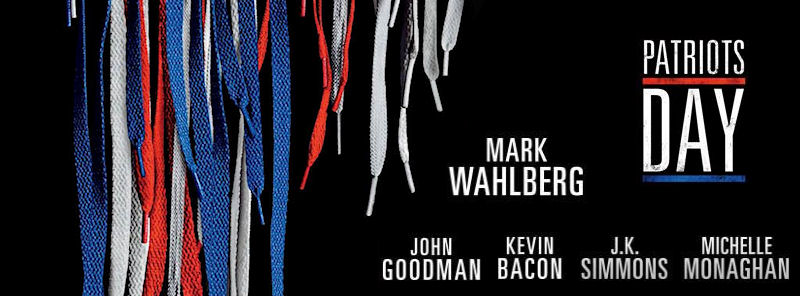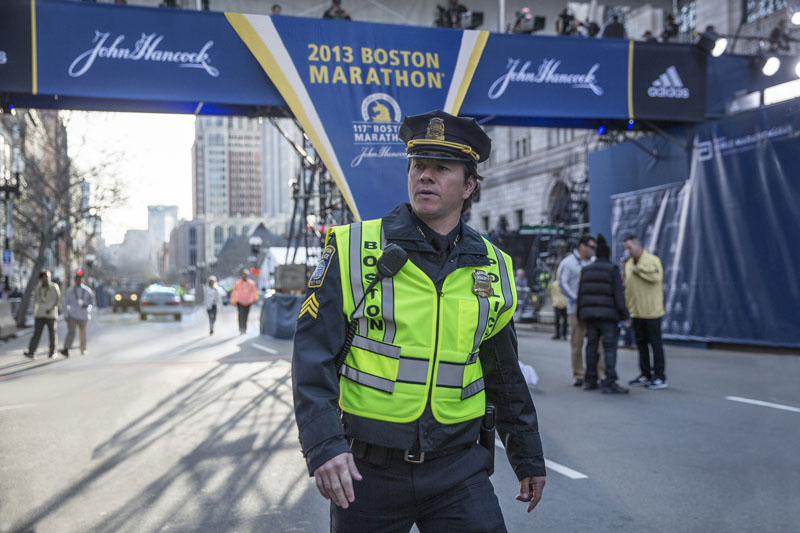From acclaimed director Peter Berg (“Deepwater Horizon,” “Lone Survivor”) and Academy Award® nominee Mark Wahlberg), CBS Films and Lionsgate present “Patriots Day.” Based on true events, “Patriots Day” is a powerful story of a community’s extraordinary courage in the face of adversity. An account of the events surrounding the Boston Marathon bombing, the tension-packed dramatic thriller chronicles in detail one of the most sophisticated and well-coordinated manhunts in law enforcement history. The events may have unfolded in Boston, but the bombing and the city’s determined response impacted the world.
The 2013 Boston Marathon bombing shattered lives and tested the fabric of the American spirit. But in its wake an entire city came together to bring the perpetrators to justice, tracking them down in record time before they could inflict further damage beyond Boston. Rather than give themselves over to panic and fear, the citizens banded together, choosing solidarity over divisiveness in pursuit of a common enemy.
The story of “Patriots Day” is drawn from real-life accounts including those of first responders, hospital workers, law enforcement investigators, government officials, everyday citizens, and the actual survivors. Through dedication and individual acts of bravery, the city – and the country – were able to emerge from the crucible stronger and more united than before, and show the world that love always triumphs over evil.
Joining Wahlberg is an all-star ensemble of actors including Kevin Bacon as FBI Special Agent Richard DesLauriers, John Goodman as Boston Police Commissioner Ed Davis, Academy Award® winner J.K. Simmons (“Whiplash,” “Juno”) as Watertown Police Sergeant Jeffrey Pugliese and Michelle Monaghan (“True Detective,” “Gone BabyGone”) as Wahlberg’s wife Carol Saunders.
As Berg sees it, “Patriots Day” is a film “about civic heroism, strength and resilience in the face of evil, a story that demanded to be told.”
“Patriots Day” provides audiences with “a deeper, more profound understanding of how the event impacted the city and how it responded,” says producer Michael Radutzky who, as producer of CBS’ “60 Minutes,” was responsible for the first investigative report of the incident. The piece, which centered around Boston Police Commissioner Ed Davis, aired less than a week after the bombing. “There is something special about how Boston handled the attack, something about the city’s innate spirit, the resolve of the survivors and the commitment of everyone involved to bring closure.”
Radutzky notes Berg was the ideal director for the project. “Pete’s a masterful filmmaker who found the humanity in the story, treating the subject honestly and accurately.”
Adds producer Hutch Parker. “I can’t think of another filmmaker who has chosen to tackle so many non-fiction adaptations, and done it so well, which is difficult because you know that you not only have to tell a good, entertaining story, but one that honors the facts. On that score, when you look at Pete’s history, from ‘Friday Night Lights’ to ‘Lone Survivor’ to ‘Deepwater Horizon,’ no one really does it better.”
Like many Americans, Berg had followed the events from the beginning. “I was moved by how the city rallied together to capture the perpetrators and how they continued to support each other,” says Berg.
Another theme that intrigued Berg was the way in which these acts of terrorism impacts contemporary society. “This horrific incident and others like it happening all over the world are acts of true cowardice carried out by religious extremists and other radicalized individuals targeting innocent people,” he says.
“What’s powerful, haunting and disturbing about this event, is that it didn’t happen in the mountains of war torn Afghanistan or a besieged city in the Middle East, but rather on Main Street USA.”
Berg was also keen to showcase the unified effort by the Boston area law enforcement working in close proximity with the FBI and how they coped throughout the ordeal, performing tirelessly under the most trying of circumstances – with the whole world watching. “The selfless courage of members of our military and law enforcement has been a source of ongoing inspiration to me,” he says.
Berg and his fellow filmmakers meticulously researched the story, spending several months meeting with local police chiefs, FBI case agents, Massachusetts State Police and other law enforcement, and community and organizational leaders to ensure that the film accurately depicted the real-life experience.
“The only way this movie would work is if the city of Boston was a character in the movie. We needed them to be partners in the process, because we owed it to them to get it right,” remarks Berg.
“The time we spent in Boston early on with those touched by these events was essential,” explains producer Scott Stuber. “It was the only way to make sure that we were telling the story accurately and with the right attention to detail. We gave them all our contact numbers so if there was a problem, or if they had a memory about the event, they could call us and discuss it. We wanted them to have the same kind of access the city had given us, to establish a true camaraderie.”
“Patriots Day” relies on multiple story lines to capture the tension that engulfed the city during the 105-hour manhunt. “Thousands of people’s lives were touched by this,” says Berg. “To capture the scope, we decided to follow seven or eight characters, each of whom was affected in a different way. No one in Boston knew what was going to happen next and there was a real concern that there’d be more attacks – and justifiably so. We were able to give a broader picture of the impact the bombing had on the city, both through individual acts of bravery and amazing acts of kindness and compassion.”
Just as Berg was the obvious choice to direct the film, who better to represent Boston’s can-do spirit and dedication than native-born son and Academy Award® nominee, Mark Wahlberg, who grew up in the city’s Dorchester neighborhood and would take on a central role in the film. Wahlberg also served as producer on the project.
Wahlberg confesses that, initially, he was a bit reticent to jump on board. “It’s such a sensitive subject to me because everyone in Boston knows someone who was directly affected. If I was going to do it, I wanted to make sure that we got the story right.”
Another consideration was whether it might be too soon after the bombing to tell the story. “But when I started to think about it,” explains Wahlberg, “my reaction was that if we don’t do it, someone else will and if they don’t come at it with the utmost respect and sensitivity it’s going to be a major problem.”
“Nobody’s going to dictate our freedom. Stay strong.”
– David “Big Papi” Ortiz, Boston Red Sox
In experiencing the film, the goal is for audiences to take away hope and optimism.
“I hope this film works as a visceral experience, so that for two hours the audience gets caught up in the emotion and the energy and the intensity that infused the city in those 105 hours between the bombing and the capture of the brothers,” says director Peter Berg. “And I certainly hope that it becomes an opportunity for people to have a discussion about what is happening around us today and why it’s happening, and how at the end of the day love wins.”
Adds Wahlberg: “People will continue to do bad things, but they cannot dictate how we live our lives. We need to be able to go to a marathon, we need to be able to go to a baseball game, we need to be able to go to the movies, we need to be able to live normal lives and we all have to come together. The people of Boston showed that, in the end, love of our fellow man is always going to win out. That’s why this story needed to be told. And why the film’s positive message should be seen by everybody.”
“So much of what inspired us all in this story is the way in which Boston, its people, its law enforcement, its first responders, its survivors, understood that the way forward was to remain strong; to carry on in the face of something that was otherwise unthinkable,” says producer Hutch Parker.
Producer Scott Stuber adds, “the film’s message is about standing up, standing together and doing what’s right.”
The message of the film is perhaps best put into words by the real people:
Police Sergeant Jeffrey Pugliese: “I’m a true patriot. I really do believe in America. I really, really do. I think Boston Strong, which is also America Strong, shows that we are going to stand up and defend ourselves. We’re not going to take it and be beaten down.”
Survivor Patrick Downes: “The bombs went off and wreaked incredible havoc, death and destruction, but in that immediate instant afterwards, people ran toward us.”
Former Boston Police Commissioner Ed Davis: “When I first heard the term Boston Strong, about two days into the investigation, and for me it was emblematic of how tough the city and its residents can be.”
Former FBI Special Agent in Charge, Boston Division, Richard DesLauriers: “In the weeks after the bombing, when I had the opportunity to visit some of the most severely injured survivors, I was absolutely amazed by the strength and resiliency of the human spirit exhibited in these individuals. It was absolutely amazing.”
Former Governor of Massachussetts Deval Patrick: “I think that day...the bombers took lives and limbs, they took some of our sense of security. But they took a lot less than they intended. And they gave us back some things they didn’t intend...they gave us a stronger sense of community, a common cause. And I think we’ve seen that in other examples, in other cities around the world.”
Dun Meng: “When we have a challenge, we have a problem...we are facing it together. We always have hope. Be confident that good always defeats bad.”
Survivor Steve Woolfenden: “I have a tremendous amount of optimism and hope for the future.”
Survivor Jessica Kensky: “This has been the absolute worst and lowest time in our lives, as well as the best. After being the recipients of such incredible care and kindness, the very least I can do is get out of bed and try again, and try and make this world a little bit better for someone else.”
Survivor Patrick Downes: “When we see the news that another attack has happened, in Brussels, in Islamabad, Nice...Orlando, San Bernardino, Paris... I think it’s important we think of these people around the world, not as victims of violence, but ambassadors for peace.”











